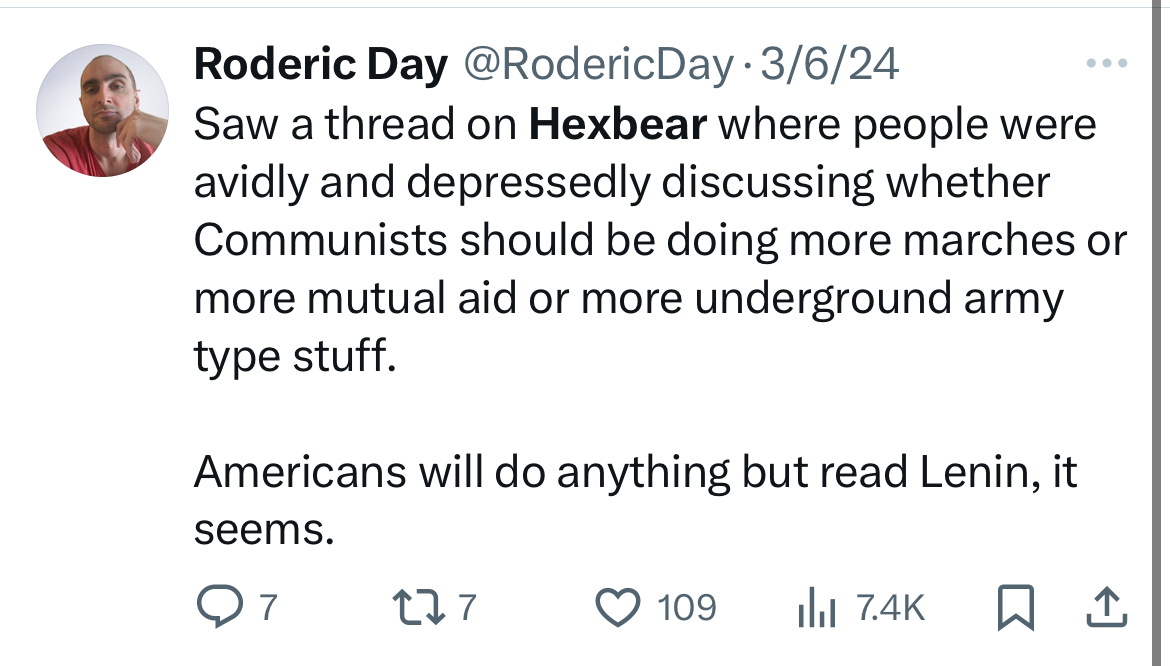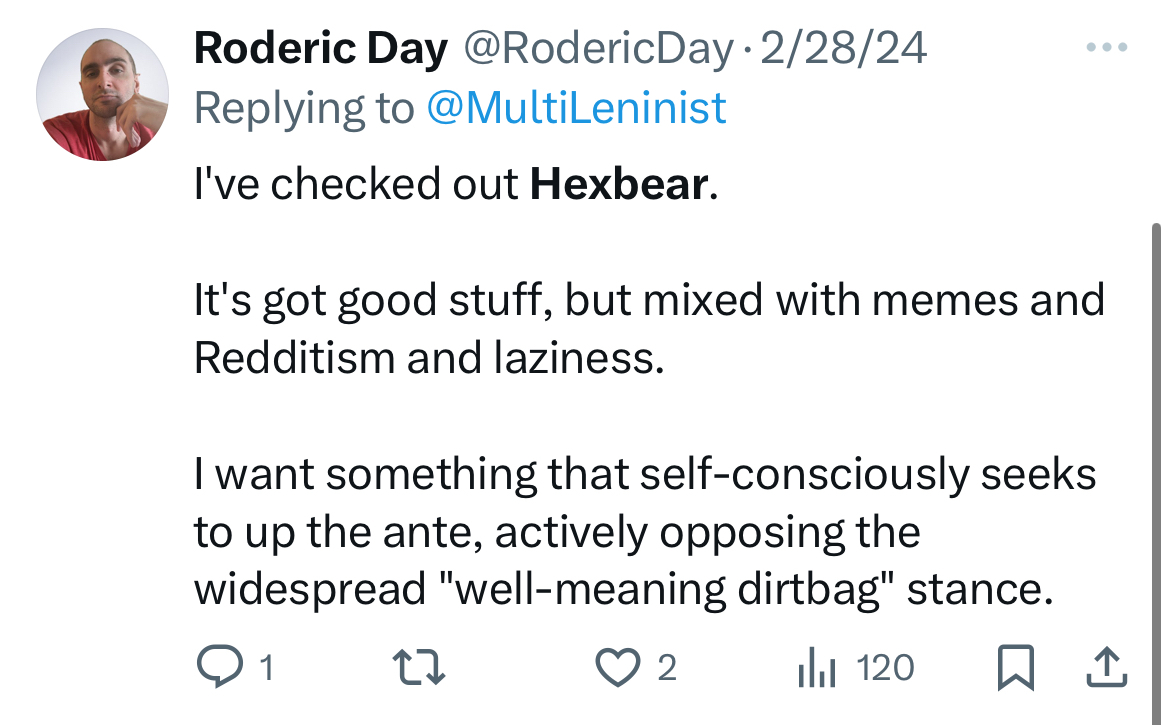- cross-posted to:
- leftistinfighting@lemmygrad.ml
- cross-posted to:
- leftistinfighting@lemmygrad.ml
I don’t really think he knows this site’s culture at all. No one is dissuading people from reading theory lol
Show


Show


I don’t really think he knows this site’s culture at all. No one is dissuading people from reading theory lol


What of Samir Amin in particular? I haven't read too much theory recently after a hard burnout but I'd be down to read whatever you think is relevant
Oh "The liberal virus" is a much shorter work and is a pretty good introduction to his style, to see if you like it or not. Honestly I think people should recommend it over Mark Fisher's Capitalist Realism, the latter is full of random digs at "market Stalinists".
Here's the comedic introduction from The Liberal Virus
TOWARDS THE END OF THE TWENTIETH CENTURY a sickness struck the world. Not everyone died, but all suffered from it. The virus winch caused the epidemic was called the "liberal virus." This virus made its appearance around the sixteenth century within the triangle described by Paris-London-Amsterdam. The symptoms that the disease then manifested appeared harmless. Men (whom the virus struck in preference to women) not only became accustomed to it and developed the necessary antibodies, but were able to benefit from the increased energy that it elicited. But the virus traveled across the Atantic and found a favorable place among those who, deprived of antibodies, spread it. As a result, the malady took on extreme forms.
The virus reappeared in Europe towards the end of the twentieth century, returning from America where it had mutated. Now strengthened, it came to destroy a great number of the antibodies that the Europeans had developed over the course of the three preceding centuries. It provoked an epidemic that would have been fatal to the human race if it had not been for the most robust of the inhabitants of the old countries who survived the epidemic and finally were able to eradicate the disease.
The virus caused among its victims a curious schizophrenia. Humans no longer lived as whole beings, organizing themselves to produce what is necessary to satisfy their needs (what the learned have called "economic life") and simultaneously developing the institutions, the rules, and the customs that enable them to develop (what the same learned people have called "political life"), conscious that the two aspects of social life are inseparable. Henceforth, they lived sometimes as homo economicus, abandoning to "the market" the responsibility to regulate their "economic life" automatically, and sometimes as "citizens," depositing in ballot boxes their choices for those who would have the responsibility to establish the rules of the game for their "political life."
The crises of the end of the twentieth century and the beginning of the twenty-first century, now happily and definitively left behind, were articulated around the confusions and impasses provoked by this schizophrenia. Reason-the true one, not the American one-finally caused it to disappear. Everyone survived, Europeans, Asians, Africans, Americans, and even Texans, who have much changed since and become human beings like the others.
I have chosen this happy ending, not through some incorrigible optimism, but because in the other hypothesis there would no longer be anyone left to write history. In that version, Fukuyama was right: liberalism truly announced the end of history. All of humanity perished in the holocaust. The last survivors, the Texans, were organized into a wandering band and then immolated in turn on the orders of the chief of their sect, whom they had believed to be a charismatic figure. He too was named Bush. I imagine that the history of our epoch will be written somewhat in these terms. In any case, it is in the same terms that I here propose to analyse these crisies.
It also randomly called Tony Blair's New Labour an example of how neoliberalism could more truly embody Stalinism than the USSRs state socialism could (bcs according to Fisher, Stalinism is actually nothing to do with ML thought, its really just when there's a government and people fill in forms apparently )
)
The critique of "state socialism" or "state capitalism" by the western left will never not be funny. If the western left plan to seize state power and get back on the road to socialism, they themselves will have to implement similar economic systems.
this is why i don’t spend a lot of energy trying to convince my western leftist friends to critically challenge their historical perspective on people like mao or stalin. when one of those decade-weeks happen, they’ll see the revolution won’t be clean; they’ll have to acknowledge what is to be done. i think it’s much more effective to focus on proper analysis rather than factual accuracy.
of course, that is not at all to say that the latter is unimportant.
What the fuck is "market Stalinist" even supposed to mean?
I'm guessing a critique against the concepts of state socialism or state capitalism.
It really depends on what you want, more social or more economic analysis. At the end of the day, it's all interlinked. You cannot truly seperate the social from the economic.
Though I think that "Eurocentrism" and his critique of culturalism should be required reading everywhere. Though "The liberal virus" is a much shorter work and could be a good introduction.
For more a more modern economic focused work, there's "Modern Imperialism, Monopoly Finance Capital, and Marx’s Law of Value". Be warned though that there is a lot of mathematics involved, and you will have had to have read Marx prior to try to understand it.
You don't have to read or watch anything if you don't want to, and if you're burnt out, a lot of his long from lectures from the past are available on YouTube.
I think this interview series is very short and relevant today
I found a YouTube link in your comment. Here are links to the same video on alternative frontends that protect your privacy:
I believe she has a suit of power armor from the Chozo and fights Space Pirates on the reg.